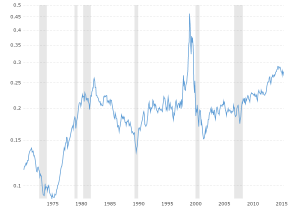Long term investing has always been regarded as the easiest fundamental approach towards growing real wealth. From institutional investors to investing legends such as Warren Buffet and Peter Lynch who’ve all followed this strategy for decades, it’s a classic approach that requires patience more than anything.
Being told not to touch your holdings and obsess over market trends and alerts is harder than it seems.
In basic terms, buy and hold is a way to trade stocks. The reason you would buy is to buy a share (piece) of a company and hold is to wait off on buying the stock in hopes for it to reach a higher more attractive price.
The reason stock prices may be so low, below $10 which are considered penny stocks is because there is low anticipation for earnings and no future growth outlook. Although cheap stocks are attractive, holds are a popular approach to protect investors against downfall in case they plummet.
Ultimately value investing — buying low selling high is always the way to go to protect yourself against inflation, build up a nest egg and passive income streams. Currently, value stocks have outperformed growth stocks which are traditionally tech stocks due to the rising interest rate environment.
When interest rates rise, investors pool their money away from safe haven assets such as bonds due to lessening fear about the economy. This leads equities (stocks) and bonds to compete. Bonds become less expensive as yields rise in a rising interest rate environment leading investors to readjust their holdings as herd immunity, inflation talks and the Fed are gearing up for reopening.
When it comes to the market, this is the easiest way to build up your income streams and requires little to no work upfront. Since investing is ultimately based on trading and predicting how well sectors and industries will perform in the long run, the longer you can wait out your losses, the more gains you’ll see.
Unfortunately with our short attention spans and instant gratification these days, that is tough to get by on yet the first attempt is to simply understand your risk tolerance (conservative, moderate or aggressive)-the older you are, the less risk you should take because of your shorter time span and less stable earnings income, short/long term goals (what are you investing for) and ultimately if you are fine with managing risk- beta the biggest problem most investors cannot wrap their heads around.
Good news, if you want to become rich quick overnight, it only takes a few years to really master historical trends, mostly luck, meticulously tracking the markets, be a part of every Reddit and Discord feed possible and take risk on unprofitable stocks that have no future.
As you can see, no matter how much experience you have, you don’t have a crystal ball and cannot predict the future but what you can predict is when you buy and sell, what you look out for and how you assess risk.
Make your life easier by looking long term, a few months to years down the road. You will not only save more money, time, headaches and volatility swings, you’ll make a decent return roughly 10–15% as the major indexes have proven consistently going higher year over year.

Long Term Investing Pros and Cons
Since day trading isn’t the preferable way to make consistent returns over the long term, here are ways why passive income is your best and easiest way to maximizing returns.
Pros
The Market Consistently Goes Up
If you invested $100 in the S&P 500 at the beginning of 1900, you would have about $8,628,046.08 at the beginning of 2021, assuming you reinvested all dividends. This is a return on investment of 8,627,946.08%, or 9.85% per year.
Not only this investment result beats inflation during this period for an inflation-adjusted return of about 273,519.78% cumulatively, or 6.76% per year, all other major indexes such as the Dow Jones Industrial Average to the Nasdaq have all seen their composites all go up in history.

Tax Advantages
You only pay tax on your holdings if you sell them at a gain. Otherwise there are massive tax benefits from simply holding your stocks as they are taxed at capital gains rate which is lower than your short-term capital gains or worst of all, income tax rate.
The best way to avoid tax at all is to keep riding the waves in the stock market. There’s no doubt there will be short-term volatility but that doesn’t mean you should be influenced by it as it’s just an indication there are trades going on.
No Time, No Problem
If you don’t want to keep up with the daily headlines, quarterly earrings reports and Squawk Box every morning, passive investing is your way to go. The beauty about investing in index funds is that you don’t even need to know all of the stocks in your basket of funds. For example, SPY is an ETF that mirrors the performance of the S&P500 or you can choose the Vanguard mutual fund VTSAX which tracks the Dow Jones index.
Analysis Not My Jam
Rather than trying to interpret analysis graphs, charts and predict future performance, all you have to focus on is the present and most logical assumption for what can happen in the future. Understanding companies balance sheets, income statements and cash flows is a pain, focus on baskets of stocks in an index or ETF instead. No one has a crystal ball but more often than not, the more reputable, reliable, blue-chip defensive stocks always beat out the market the most. Don’t make it a game, be realistic and focus on what products/services you use or works in society.

Cons
Too Ignorant
With not enough information to invest wisely, you may be missing out on some stellar gains. Obviously long term investing isn’t about beating out the benchmarks, rather tracking indexes and earning consistent solid gains over an extended period of time. If you are younger, it is recommended to have a heavier consolidation into active investments ( individual stocks) simply because you are able to outweigh the losses through gains over time but that doesn’t mean you can still loose.
Assess where you are in your financial plan and if doing more due-diligence on a company is better suited for where you want to be.
Leaving your indexes alone may not provide you as much upside as doing more work, but at the same time, might not be better either.
As a result,
You get out what you put in.
Tied Up
Investing in the long term means you don’t plan on using or withdrawing the funds anytime soon. You are a laid back, stoic and a consistent deliberate investor but that could also mean you might not be keeping up with the latest companies that you could be profiting off of.
Staying disciplined with an appropriate split of passive vs active investments in your portfolio is key.
Don’t spread yourself too thin or have too many eggs in 1 basket.
Not For the Emotionally Vulnerable
We always weigh our losses more than our gains and when it comes to investing long term and not fiddling with your stocks, it can be very tempting for most to sell/buy/move any positions whenever they see a correction.
Downturns and recessions are a healthy way for the economy to stress test companies. If everything was always jolly, evaluations would be out of the roof and companies would be very hard to value correctly.
Yet, what is certain is that all recessions do recover, they just take time. Although history repeats itself, it’s different every time as well. With more younger retail investors getting into the market through WeBull and Robinhood, it can be especially hard for them to simply wait out their losses and have risk management to keep themselves at bay. A way to manage any crash, downturn or drop appropriately is to never equate emotions to the market or you’ll be toast.
You Still Need To Have a Check-Up
Buying and holding random stocks and index funds cannot solely guarantee profitability in the long run. Just like building a sandwich or studying for a test, there needs to be a methodical and proven plan to your strategies. Although index funds and ETFs make it quick and easy to just invest in them, make sure you know what you are getting yourself into as well. Money managers love to advertise products for their own benefit, not necessarily at your best interest. Stay vigilant and careful.
These indexes still must have a proven track record and monitor stocks that have future potential. At least with active individual stock picking, there’s more on the line compared to an index fund which is highly diversified and if 1 stock tanks, the others will compensate but it’s always important to never let your ego stand too tall.

Recap
Long term investing is an effective strategy towards building LONG TERM growth and a balanced, diversified portfolio. Since the markets always go up in the long run, this does guarantee profitability if you are able to test your patience. Practitioners of this strategy make sure their emotions aren’t tied to the market along with checking-in with their strategies once in a while. They don’t treat the market as a casino or gambling game, instead like a tool to help them build the life they deserve.
It never hurts to have a game plan on what you plan on using the funds for as well especially since the market is at record highs these days.
Emotional euphoria is upon us. Stay in your lane and know what you’re in for.

